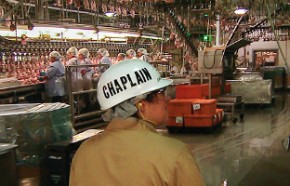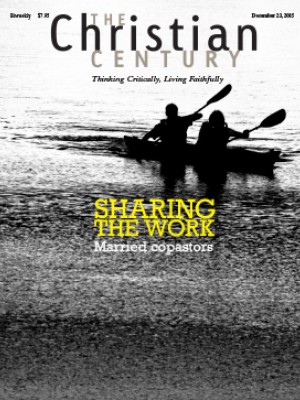A chaplain’s place
The documentary Chaplains raises a fundamental issue for Christian chaplaincy: what is its relationship to the church?

In the documentary film Chaplains, Buddhist chaplain Karuna Thompson offers an unusual—to me—theological foundation for the compassion she shows to the men she works for at an Oregon prison. All of us have countless past lives, she says, and in one or more of them we could have been prisoners. We could also be imprisoned in a future life. This recognition sparks compassion.
That belief is more compelling than her repeated insistence that people are essentially good. The men interviewed have murdered and robbed and don’t seem ready to speak of themselves as trusting their inherent goodness.
Yet I found myself moved by Thompson’s work, as when she helps a Wiccan-observant former U.S. Army soldier trying to prepare for life outside of prison after nearly a quarter century. Will he reoffend? The state of Oregon is paying Thompson’s salary in hopes that he will not. The investment may be paying off—the film reports that Oregon’s recidivism rate is only 23 percent, compared to a national average of 43 percent.
Read our latest issue or browse back issues.
Chaplains, produced by Martin Doblmeier (who also made the film Bonhoeffer), raises a fundamental issue for Christian chaplaincy: What is its ecclesiology? When a Catholic or Baptist serves as a chaplain for the U.S. military, he or she is a soldier no less than any other person wearing a uniform. Sure, the church ordains and nominates chaplains, and they are noncombatants. But they work for the United States government, not for any specific faith community.
A chaplain’s job is to serve the spiritual needs of everyone in his or her care. A Buddhist chaplain in Oregon has to provide amplifiers for evangelical praise music, drums for Native American circles, and a priest and wafers for mass. When a chaplain for Tyson Foods insists that the job isn’t just to patch people up so they can go out and make more money for Tyson, one has to wonder: Would Tyson pay for a chaplain if the chaplain’s presence weren’t profitable in some way? Would the army, the hospital, or the prison pay for chaplains if they didn’t serve their respective causes? Shouldn’t the local church minister to its members and communities rather than outsource personnel to secular institutions?
One military chaplain in the film tells of soldiers in Iraq coming to him to ask if their souls are endangered. We can only imagine what sorts of things they’ve done in our name. He reassures them that their souls are not in danger: if they’ve followed lawful orders, the culpability for giving those orders is on the head of those who issued them. But can we be so sure? Should the church dispense such assurance so glibly? Could a chaplain who responded “I don’t know” to that question keep her job? And isn’t “I don’t know,” at least in some cases, a more truthful response?
I’m more sympathetic to prison chaplaincy. In a nation that warehouses 2.2 million people, some of the only outsiders who care about the incarcerated come from religious communities. The film follows the work of Calvary Chapel of Southeast Portland, which treats the Oregon prison almost like a campus of its church. Its members offer instant relationship, social capital, and material help when prisoners are released.
Pastor Doug Snow says, “I probably shouldn’t say this on camera, but we have ushers counting money who’ve robbed banks. That’s God’s grace.” He grants that some think the church is doing too much for “those people” and end up leaving. Would that every congregation would engage its local prison in ways that are costly for them and life-giving for others.
Another interesting portrait is of Muslim chaplain Khalil Refai, who mediates between the police department and the Muslim community in Hamtramck, Michigan. Hamtramck has always been an immigrant landing place—for Poles a century ago, and for Muslims now.
The film shows a traffic incident in which an angry young Muslim man bolts from a car and runs toward a police officer shouting, “Racist!” Refai shouts back that the cop is not a racist: “He is my friend.” One could imagine a scenario in which a frightened police officer opens fire. The images of white descendants of Polish immigrants communicating with residents via a Muslim chaplain moved me. Perhaps chaplains can help build places where people talk first and shoot later or not at all.
I’m reminded of a pacifist I know who became a military chaplain because the position allows her to minister to the poor in a way that her Episcopal denomination rarely manages to do.
This seems to me the great virtue of chaplaincy: it’s a way to get to people who otherwise would be off-limits. This film opens up lives and ministries that usually remain hidden. The film raises questions, but reflects a God who is indiscriminate about the means God uses to reach people.






